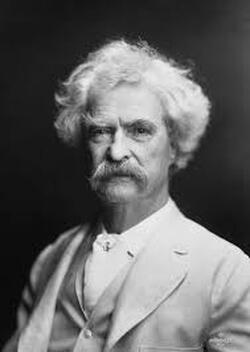 One of America’s greatest authors of all time was Samuel Langhorne Clemens, known by his pen name Mark Twain (1835-1910). He was born in Missouri when it was considered the west, and continued moving west until he decided it was time to jump continents and live in Europe. Known for his wit, his analysis of human behavior, and at the end of his life his love for young people, Twain’s writings exemplify what it meant to be an American living in the 1800s. Change, moving west, honesty, independent-minded, funny, self-critical and struggle was the story of Mark Twain. Twain is famous for his literature. His one-liners tell us a great deal about him. “Action speaks louder than words but not nearly as often” “The secret of getting ahead is getting started.” “I once fell into a California river and got all dusty.” “Whenever you find yourself on the side of the majority, it is time to pause and reflect.” “Giving up smoking is the easiest thing in the world. I know because I’ve done it thousands of times.” “The best way to cheer yourself up is to try to cheer somebody else up.” “Part of the secret of a success in life is to eat what you like and let the food fight it out inside.” “You can’t depend on your eyes when your imagination is out of focus.” Throughout Twain’s writing life, he made Americans, and others around the world, laugh at themselves, laugh at others, and question if what they were doing was the right thing. Called the greatest American author that ever lived, Mark Twain’s life was all about moving, change, honesty and integrity. Samuel Clemens was born in Missouri and raised in Hannibal, right next to the Mississippi River. He became Mark Twain when his writing career took off. That river became the focus point of two of his most famous novels about a boy growing up in 1800s America, The Adventures of Tom Sawyer and The Adventures of Huckleberry Finn. At various times throughout America’s history, these books have been forbidden by libraries because of their use of the “N Word,” even though Twain wrote in the vernacular and even though these books do not support racism. Three of Twain’s siblings died young, and his dad died when the boy was only 11. After his father’s death, Twain left school and became a printer’s apprentice, then a typesetter, then a printer, writing various humorous stories while working in New York City, Philadelphia, St. Louis, and Cincinnati. He came back to the Mississippi River and trained for two years for his dream job, a steamboat pilot. He worked as a pilot until 1861, when the Civil War broke out. He joined the war as a Confederate soldier, and after two weeks, he quit and “lit out for the West.” In the west, Clemens tried and failed as a miner and went back to writing. While writing articles for various newspapers, in Nevada and then in California, he also wrote short stories, such as “The Celebrated Jumping Frog of Calaveras County.” He was hired to travel to Europe and the Middle East and write about it. On this trip, fellow passenger Charles Langdon showed him a picture of his sister. Mark Twain described the moment as falling in love with the woman at first sight. This girl in the picture later became his wife! She wasn’t even on the boat. Samuel Clemens married Olivia Langdon in 1870 in New York and had three daughters and one son (who passed away at 19 months). Samuel and his wife were married for 34 years until Olivia’s death in 1904. Through his wife’s family, Samuel Clemens met Harriet Beecher Stowe, Frederick Douglass, and other important figures of the day. In the 1870s and 1880s the Clemens family lived in Connecticut, where Mark Twain wrote many of his famous novels. While Mark Twain was a famous author, he made poor investments that caused his bankruptcy. Trying his hand with inventions and technology, Twain lost nearly all his financial worth. For much of the 1890s, the Clemens family lived in various countries of Europe, seeking help from their poor health, searching for less expensive places to live, and in between, Twain would come back to the states to try to resolve his financial problems. Even though Twain had declared bankruptcy and did not need to pay back his debtors, he went on a year-long arduous world lecture tour to make enough money to pay back all those who had ever loaned him money. Mark Twain was a sought-after speaker, performing humorous solo talks, similar to modern stand-up-comedy. Mark Twain had believed America should spread the American way of life around the world. However, after supporting the Spanish-American War of 1898, he had a change of heart and became an anti-Imperialist. He saw how the USA fought the Philippines instead of allowing this people their independence immediately. Twain said, “I am opposed to having the eagle put its talons on any other land.” In the later years of Twain’s life, he lived in Manhattan. After his daughter died in 1896, his wife in 1904, and then another daughter in 1909, he understandably was depressed, at times. He still wrote, however, and, he even formed a club for girls who were interested in writing. Called the “Angel Fish and Aquarium Club” for a dozen girls between the ages of 10 and 16, Twain exchanged letters, took them to concerts and the theatre and played games with the kids. In 1908, Twain wrote that the club was his “life’s chief delight.” Mark Twain predicted that he would die when Halley’s Comet came closest to Earth in 1910. He believed this because he was born two weeks after the Comet was closest to Earth in 1835. Twain said, “I came with Hally’s Comet in 1835. It is coming again next year, and I expect to go out with it. It will be the greatest disappointment of my life if I don’t go out with Halley’s Comet. The Almight has said, no doubt: Now here are these two unaccountable freaks; they came in together, they must go out together.” Mark Twain died on April 21, 1910, one day after Halley’s Comet was closest to Earth. He lived a life of integrity, humor, and devotion, as well as being one of America’s greatest authors of all time. His writings continue to cause laughter and controversy today. He could have chosen to not pay back his debts, but he left his family for one year to pay his creditors. Towards the end of his life, when those closest to him had died, he supported and encouraged young girls in their writing and enjoyment of life. Ernest Hemingway wrote of Mark Twain, “All modern American literature comes from one book by Mark Twain called Huckleberry Finn.” Questions
0 Comments
Leave a Reply. |
John De GreeJohn De Gree writes the current events with a look at the history of each topic. Articles are written for the young person, aged 10-18, and Mr. De Gree carefully writes so that all readers can understand the event. The perspective the current events are written in is Judeo-Christian. Receive Articles and Coupons in Your EmailSign Up Now
For Email Marketing you can trust. Archives
June 2024
Categories
All
|
|
SUPPORT
|
RESOURCES
|
|


 RSS Feed
RSS Feed



